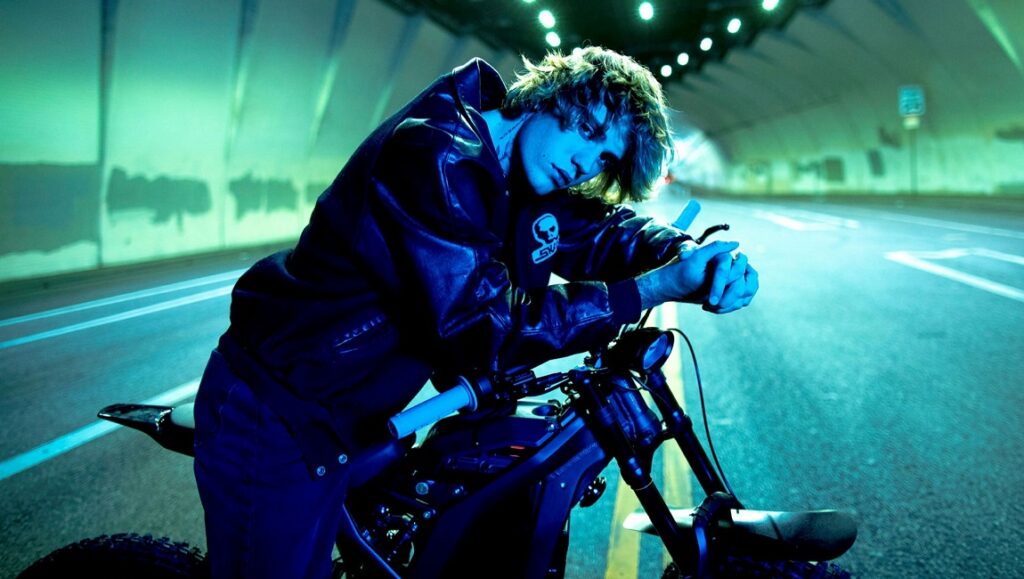Facile, mawkish songwriting, bland production, and an overly-affected show of “authenticity” do major injustice to Justice.
Justin Beiber wants to sell you a narrative: that the once-dumb adolescent from Ontario has grown up, found God (ok, he’s always had that), gotten married, and become a changed man for the better. This is something of a foregone conclusion to the arc he started with 2015’s Purpose, his Bildungsroman that indicated a shift away from his early 2010s teenybopper roots and into a mature professional phase. It was a thinly veiled rebranding ploy after a series of absurd episodes (including abandoning his pet monkey in Germany) and public breakups (two of the biggest singles from the cycle were in response to his former belle, Selena Gomez), but skated by on its natural charms and a grand sense of sonic scale. Then, following five years of world-charting collaborations with DJ Khaled and Luis Fonsi, he dropped Changes, a lowkey, R&B-aspiring record in the vein of 2013’s Journals, which produced fewer hits — Bieber pitiably told his fans to stream “Yummy” at all times of the day, even they were asleep, in order to chart higher — was critically reviled, and presented JB with his first case of pure parasocial disconnection.
Justice, Bieber’s sixth album, has been hastily recorded and marketed as a corrective to this minor bump, though it does feature the similar, singular thematic vision that concerned his last release: that the Biebs loves his newlywed spouse, and gosh darn it, he needs you to know about it! That might come off as a tad malignant towards the young buck, but it’s an unsurprising reaction to how across-the-board facile his songwriting is over the project’s 16 tracks: He continues to strike upon the same mawkish subject matter with such blunt-force repetition that it becomes numbing, presenting himself as a hopeless romantic who’s hopelessly out of touch with what constitutes real human emotion.
While the lyrics are unified by the laziest, most soft-boy idea of what matrimony entails, the music here is anything but; in an attempt to make sure the project is a full-proof smash across all demographics, Justice hides behind the anonymity of shameless, amorphous genre-swapping. This ranges from saccharine new-age Christain gospel — “Holy,” with original wife guy Chance the Rapper supplying one of his more nauseating verses (“Life is short with a temper like Joe Pesci”) — to ’80s-inspired neo-pop (the type that’s done well with Dua Lipa and The Weeknd, so hey, why not) on “Die For You,” where Bieber’s wispy tenor vocal range is barely able to deliver on the size of the track’s production. There’s also warmed-over EDM on the chorus of “As I Am,” wannabe dance-hall ballads with obligatory Burna Boy and Beam features, another re-try at passionless R&Bieber with “Peaches,” where both Daniel Caesar and Giveon completely outshine Bieber and his tasteless adlibs. Point being, there’s a lot going on, and virtually none of it sticks.
Which is a dirty shame, since, from a strictly technical standpoint, this is easily the finest Bieber has sounded in a minute. In particular, “Off My Face” and “Ghost” are carried by sincere vocal performances and cutesy double entendres, and are the few instances of clarity on a cluttered record built on overpleasing. Yes, they’re still safe and predictable, but Bieber has clearly signaled his intentions thus far: that he desires to be as boring and inoffensive as humanly possible, that he’s learned from his previous errors and is now thinking straight (though, the liberal appropriation of Martin Luther King Jr.’s presence throughout proves he still have a few too many yes-men in his corner granting validity to awful ideas).
The issues that plague the album are underscored on the Benny Blanco/ Finneas co-produced closer “Lonely.” The morose track aims to put into perspective the quiet pain of growing up famous, and serve as the final note of reflection on Bieber’s past mistakes, but there’s little reckoning for his past transgressions — he goes after the media, noting “they criticized the things I did as an idiot kid,” which, fair enough, but feels like a total sidestep of the issue — and it comes off as a plea for unconditional sympathy. He meets the basic requirements of the song’s objectives, but it lacks any sort of authenticity, as the best he can do to convey the crippling trauma of isolation is stretching out the ominous title with a pitiful wail (“I’m so lo-o-o-onely”) with no actual specifics mentioned. It seeks to finish this affair on a Big Gesture, and it should be a defining statement for his career and him as a person — but like nearly everything else he shoulders on Justice, Bieber seems utterly incapable of selling the moment.
Published as part of Album Roundup — March 2021 | Part 3.


Comments are closed.